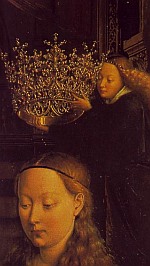Devotion for
today: St. Catherine of Siena
The feast of St.
Catherine of Siena, a doctor of the Church, and an absolutely amazing woman, is
April 29th. If you think you are busy, this is the saint for you.
Brief Biography:
Catherine was born in 1347 to a wool dyer in the Fontebranda district of Siena.
Caterina de Giacomo Benincasa, a precocious young girl, was the twenty-fourth
of twenty-five children. Catherine’s passionate desire for truth and the
knowledge of God motivated her very being, even in her youth….At fifteen, she
defied her parents and refused their efforts to force her to marry, and at
eighteen she obtained the Dominican habit….Much like Mother Teresa, Catherine
devoted herself to taking care of the sick and indigent. However, during this
period of ministering to society, she never gave up her contemplative life, and
could often be found at home in her room teaching her followers about the
Bible, theology, and God’s grace and truth. In 1370, Catherine had one of her
most profound mystical experiences – her “mystical death.” For four hours she
experienced ecstatic union with God, even though to outside observers she
appeared to be dead. This experience led her to become more severe in her
self-discipline, and enabled her to have a clear vision of the ways that she
could introduce God’s truth to the world. From the time of her “mystical death”
to her physical death, Catherine worked tirelessly in political and religious
affairs…. In 1375…she received the stigmata, though by her own request these
wounds were not visible (they were visible after her death).Catherine soon
became involved in urging Gregory XI to move the papacy from Avignon back to
Rome. During these years she was also active in preaching about clergy reform….After
Gregory’s death, Urban VI replaced him as pope. Because many people opposed
Urban when he was elected pope, Catherine foresaw the possibility that schism
could occur in the Church. She began a furious letter-writing campaign in order
to urge fidelity to the Church…. Sometime between 1375 and 1378, Catherine
founded a women’s monastery outside of Siena in the old fortress of Belcaro.
During these years she wrote The Dialogue. In this, her most famous writing, she
expressed many of her concerns about Church unity, personal austerity and
devotion, love of neighbor, clergy reform, God’s grace and mercy, and the
passionate search for God’s truth…. Her final years were filled with physical
agony…at age 33…she died on April 29, 1380. (Little
Talks With God, edited by Henry L. Carrigan, JR., Paraclete Press, 2001)
Excerpt from The Dialogue (Catherine posed questions to God and received responses which are
recorded in this book): “Know, dearest daughter, how, by humble, continual,
and faithful prayer, with time and perseverance the soul acquires every virtue.
It should persevere and never abandon prayer, either through the illusion of
the devil or its own fragility. That is, it should never abandon prayer either
on account of any thought or movement coming from its own body, or on account
of the words of any creature. The devil often places himself upon the tongues
of creatures, causing them to chatter nonsensically, with the purpose of
preventing the prayer of the soul. All of this the soul should pass by, by
means of the virtue of perseverance.” (ibid)
Prayer: O Saint
Catherine of Siena, God our Father enkindled the flame of holy love in your
heart as you meditated on the Passion of Jesus His Son. Moved by His grace, you
devoted your life to the poor and the sick, as well as to the peace and unity
of the Church. Through your intercession, may we also come to know the love of
Jesus, bring His compassion to all, and work for the unity of His Church. We
ask this in Jesus' Name and for His sake. Amen.
My thoughts: St. Catherine of Siena is not for the faint of
heart. She was probably one of the strongest, boldest, most active, most
prayerful and most influential woman of her time. To grasp at the powerful ways
God used her, read a fascinating account of her life at http://www.ewtn.com/library/MARY/CATSIENA.HTM.
Her book, cited above, only serves to solidify that this saint was truly loved
and used as a messenger by God. I find her so inspiring because
of all she accomplished by the time she died at age 33, but mostly because of
her profound love for God and her passionate desire to bring all souls to Him.
She had received vivid visions of hell, and knew that she wanted no one to
suffer there. May we all take inspiration from St. Catherine of Siena, and
dedicate our lives to the saving of all souls for Christ.
St. Catherine of
Siena, pray for us.
Patroness Against Miscarriages
Patroness of Fire Prevention



